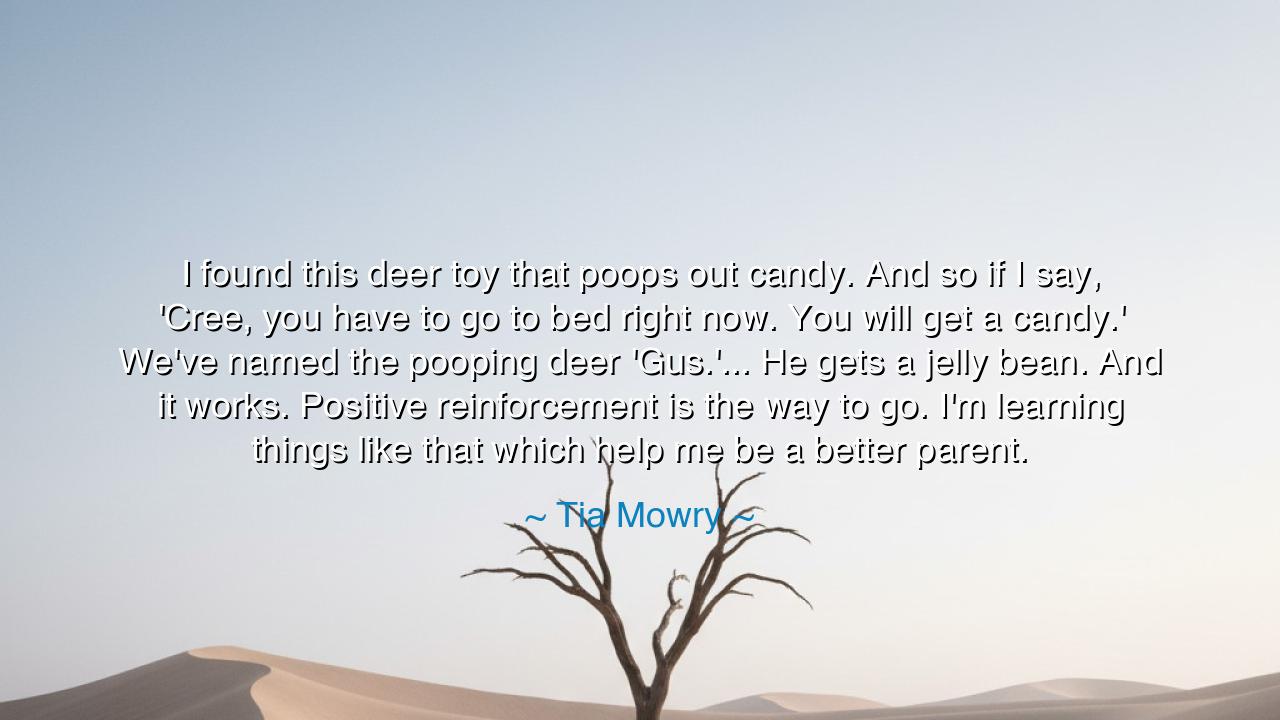
I found this deer toy that poops out candy. And so if I say
I found this deer toy that poops out candy. And so if I say, 'Cree, you have to go to bed right now. You will get a candy.' We've named the pooping deer 'Gus.'... He gets a jelly bean. And it works. Positive reinforcement is the way to go. I'm learning things like that which help me be a better parent.






When Tia Mowry said, “I found this deer toy that poops out candy. And so if I say, ‘Cree, you have to go to bed right now. You will get a candy.’ We've named the pooping deer ‘Gus.’... He gets a jelly bean. And it works. Positive reinforcement is the way to go. I'm learning things like that which help me be a better parent,” she was speaking not merely as an actress or a mother, but as a seeker of balance in the ancient art of guiding the young. Beneath the humor of her story — a toy deer that dispenses sweets — lies a profound truth that has echoed through generations: love teaches better than fear, and patience shapes the heart more deeply than punishment. Her words, though light and modern in tone, carry an old wisdom — the eternal principle that nurture, not domination, is the foundation of growth.
In ancient times, the wisest teachers and parents understood that the mind of a child is like a tender sapling, bending toward the light that warms it. The philosopher Aristotle once wrote that education must begin in joy, for “pleasure in the task puts perfection in the work.” Tia Mowry, in her simple way, discovered the same truth. The toy named “Gus” becomes not merely a dispenser of candy, but a symbol — a vessel through which positive reinforcement works its quiet magic. She learned, as all wise parents must, that guidance comes not from commanding the will, but from nurturing the spirit, teaching through kindness and reward, not fear and reproof.
Her lesson mirrors the great shift in human understanding about how love disciplines. For centuries, harshness was seen as strength, and obedience was demanded through control. But even the ancients learned — often through pain — that compassion holds greater power. Consider the story of Emperor Marcus Aurelius, the Stoic philosopher-king, who once said that gentleness is invincible because it disarms resistance. In his rule, he treated even his enemies with patience, knowing that virtue grows not through coercion, but through encouragement. Likewise, Mowry’s practice of rewarding her child’s cooperation — through play, laughter, and sweetness — reflects that same divine gentleness, made real in the realm of motherhood.
The “pooping deer” itself — a thing both comical and endearing — becomes a parable for wisdom hidden in the ordinary. In the eyes of the ancients, the mundane often carried sacred lessons. The shepherd who tended his flock learned patience from his sheep. The potter learned endurance from the slow shaping of clay. And here, in the modern home, a parent learns compassion from a toy that brings joy to a child. The lesson is simple yet profound: wisdom does not always arrive in grand revelations — it often hides in moments of laughter, simplicity, and play. Tia Mowry’s discovery is a reminder that spiritual truths are not found only in temples or texts, but in the humble rhythms of daily life.
At its heart, this teaching is about the balance between guidance and freedom. Every parent, every mentor, faces the sacred challenge of shaping another soul without crushing it. Fear may force obedience, but it breeds silence, not understanding. Reward and kindness, on the other hand, awaken cooperation and trust. In learning to use positive reinforcement, Mowry steps into a lineage of teachers who have realized that love — when paired with consistency and joy — becomes the most enduring law of growth. The jelly bean is small, but its meaning is vast: it is not the candy itself that transforms the child, but the relationship of trust it represents.
We can find echoes of this truth in the story of Anne Sullivan, the teacher of Helen Keller. Sullivan did not use force to teach the deaf and blind child how to communicate; she used touch, patience, and reward. Through encouragement, she awakened Helen’s dormant spirit until understanding burst forth like light through darkness. It was positive reinforcement — the steady affirmation of effort — that turned frustration into learning and silence into speech. What Tia Mowry discovered with her son is the same principle that has guided every great teacher and nurturer: kindness opens the doors that punishment keeps closed.
Thus, the lesson is both timeless and tender: to raise a child — or to guide anyone — is to plant hope, not fear. Let your teachings be sweet, your corrections gentle, and your heart patient. Find your own “Gus,” your own humble tool of joy, that bridges discipline with delight. Reward the good you wish to see, and it will grow. Speak softly, laugh often, and remember that every act of kindness you show a child teaches them how to be kind in return.
For in the end, Tia Mowry’s words are not just about parenting — they are about the art of leadership, love, and life. Positive reinforcement, in every form, is the practice of faith: faith that goodness responds to encouragement, faith that joy can teach as deeply as struggle, faith that love — not power — is the highest form of guidance. So, when you find your spirit weary from trying to shape the world, remember Gus the candy deer — and smile. Sometimes, the sweetest wisdom comes wrapped in laughter.






AAdministratorAdministrator
Welcome, honored guests. Please leave a comment, we will respond soon